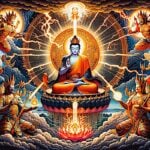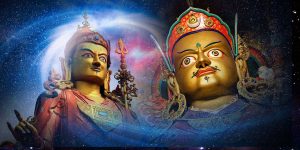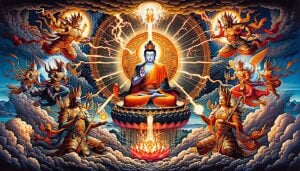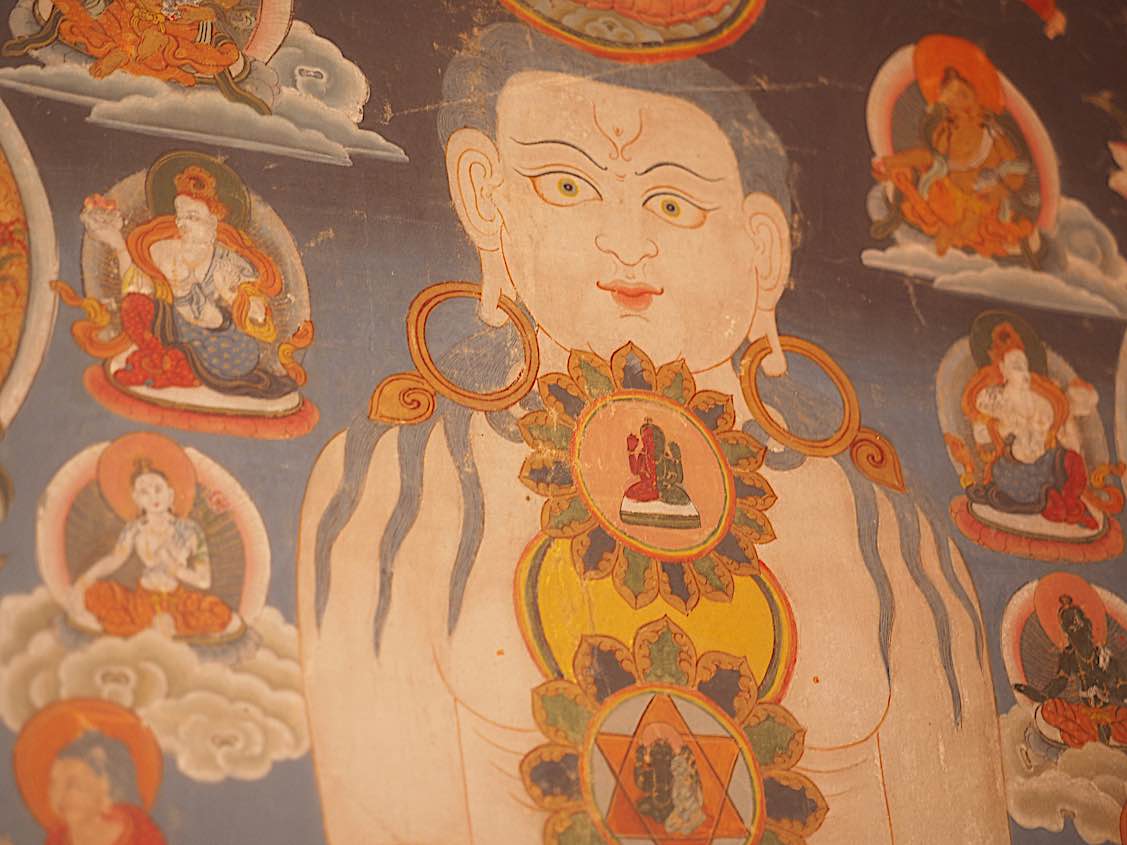“Torches That Help Light My Path”: Thich Nhat Hanh’s Translation of the Sutra on the Eight Realizations of the Great Beings
“When I was seventeen and in my first year of novice studies at a Buddhist monastery in Vietnam, I had to memorize the Sutra on the Eight Realizations of the Great Beings. Over sixty years have passed and I still find this text to be torches that help light my path.” — Thich Naht Hanh [1]

Without doubt, Thich Nhat Hanh’s English translation of this major sutra is among the best, clearest, and most engaging. The Discourse on the Eight Realizations of Great Beings is an important foundation teaching in most schools of Buddhism. As a meditative practice, this sutra is recommended for daily or regular recitation. We recommend Thich Nhat Hanh’s commentary in Awakening the Heart: Essential Buddhist Sutras and Commentaries, although the Buddha’s words here are explicit and crackling with profound truths that are easily understood.
Discourse on the Eight Realizations of the Great Beings
Wholeheartedly, day and night, disciples of the Awakened One should recite and meditate on the Eight Realizations discovered by the Great Beings.
The First Realization is the awareness that the world is impermanent.
Political regimes are subject to fall. Things composed of the four elements are empty, containing within them the seeds of suffering. Human beings are composed of Five Aggregates and are without a separate self. They are always in the process of change – constantly being born and constantly dying. They are empty of self and without a separate existence. The mind is the source of all confusion, and the body the forest of all unwholesome actions. Meditating on this, you can be released from the round of birth and death.
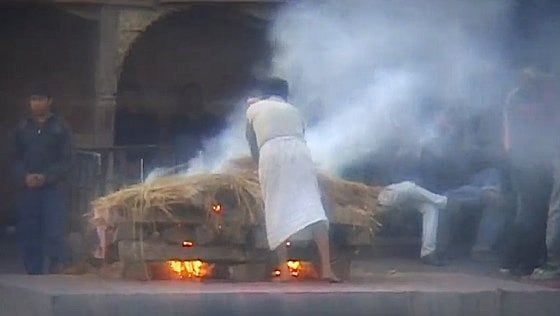
The Second Realization is the awareness that more desire brings more suffering.
All hardships in daily life arise from greed and desire. Those with little desire and ambition are able to relax, their body and mind free from entanglement.
The Third Realization is the awareness that the human mind is always searching outside itself and never feels fulfilled.
This brings about unwholesome activity. Bodhisattvas, on the other hand, know the value of having few desires. They live simply and peacefully, so they can devote themselves to practicing the Way. They regard the realization of perfect understanding to be their only career.
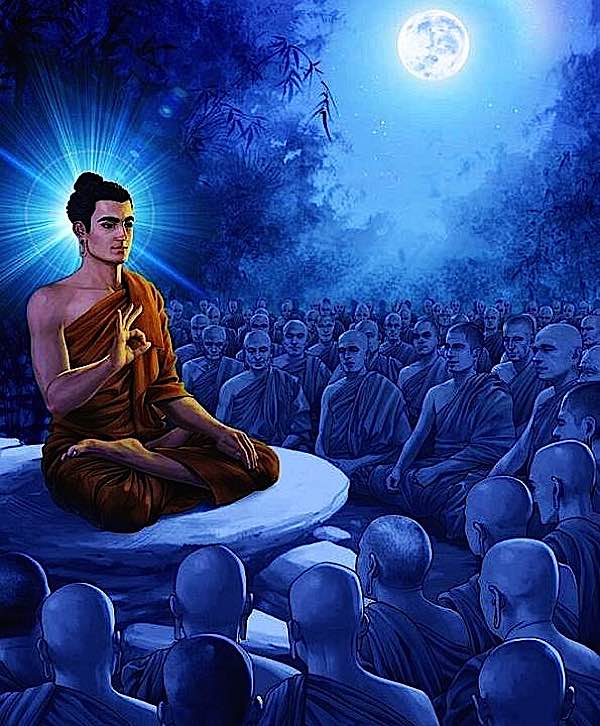
The Fourth Realization is the awareness that indolence is an obstacle to practice.
You must practice diligently to transform unwholesome mental states that bind you, and you must conquer the four kinds of Mara in order to free yourself from the prisons of the Five Aggregates and the Three Worlds.
The Fifth Realization is the awareness that ignorance is the cause of the endless round of birth and death.
Bodhisattvas always listen to and learn from others so their understanding and skillful means can develop, and so they can teach living beings and bring them great joy.
The Sixth Realization is the awareness that poverty creates hatred and anger, which creates a vicious cycle of negative thoughts and actions.
When practicing generosity, bodhisattvas consider everyone – friends and enemies alike – to be equal. They do not condemn anyone’s past wrongdoings or hate even those presently causing harm.
The Seventh Realization is the awareness that the five categories of sensual desire – money, sex, fame, overeating and oversleeping – lead to problems.
Although you are in the world, try not to be caught in worldly matters. A monk, for example, has in his possession only three robes and one bowl. He lives simply in order to practice the Way. His precepts keep him free from attachment to worldly things, and he treats everyone equally and with compassion.
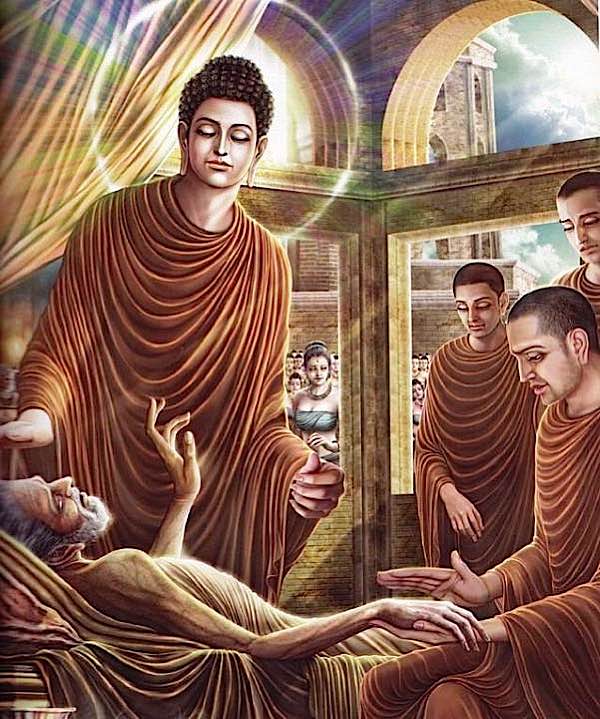
The Eighth Realization is the awareness that the fire of birth and death is raging, causing endless suffering everywhere.
Take the Great Vow to help all beings, to suffer with all beings, and to guide all beings to the Realm of Great Joy.
These Eight Realizations are the discoveries of great beings, Buddhas and Bodhisattvas who have practiced diligently the way of understanding and love. They have sailed the Dharmakaya boat to the shore of nirvana, and have then returned to the ordinary world, free of the five sensual desires, their minds and hearts directed toward the Noble Way.
Using these Eight Realizations, they help all beings recognize the suffering in the world.
If disciples of the Buddha recite and meditate on these Eight Realizations, they will put an end to countless misunderstandings and difficulties and progress toward enlightenment, leaving behind the world of birth and death, dwelling forever in peace.

NOTES
[1] From Awakening of the Heart: Essential Buddhist Sutras and Commentaries, Thich Nhat Hanh
- Paperback: 544 pages
- Publisher: Parallax Press; Original edition (December 21, 2011)
- Language: English
- ISBN-10: 1937006115
- ISBN-13: 978-1937006112
More articles by this author

Profound simplicity of “Amituofo”: why Nianfo or Nembutsu is a deep, complete practice with innumerable benefits and cannot be dismissed as faith-based: w. full Amitabha Sutra

“Torches That Help Light My Path”: Thich Nhat Hanh’s Translation of the Sutra on the Eight Realizations of the Great Beings

Maha Mangala Sutta, Life’s Highest Blessings, The Sutra on Happiness, the Tathagata’s Teaching to Gods and Men

Miracles of Buddha: With the approach of Buddha’s 15 Days of Miracles, we celebrate 15 separate miracles of Buddha, starting with Ratana Sutta: Buddha purifies pestilence.
Search
Latest Features
Please support the "Spread the Dharma" mission as one of our heroic Dharma Supporting Members, or with a one-time donation.
Please Help Support the “Spread the Dharma” Mission!

Be a part of the noble mission as a supporting member or a patron, or a volunteer contributor of content.
The power of Dharma to help sentient beings, in part, lies in ensuring access to Buddha’s precious Dharma — the mission of Buddha Weekly. We can’t do it without you!
A non-profit association since 2007, Buddha Weekly published many feature articles, videos, and, podcasts. Please consider supporting the mission to preserve and “Spread the Dharma." Your support as either a patron or a supporting member helps defray the high costs of producing quality Dharma content. Thank you! Learn more here, or become one of our super karma heroes on Patreon.
Josephine Nolan
Author | Buddha Weekly
Josephine Nolan is an editor and contributing feature writer for several online publications, including EDI Weekly and Buddha Weekly.




